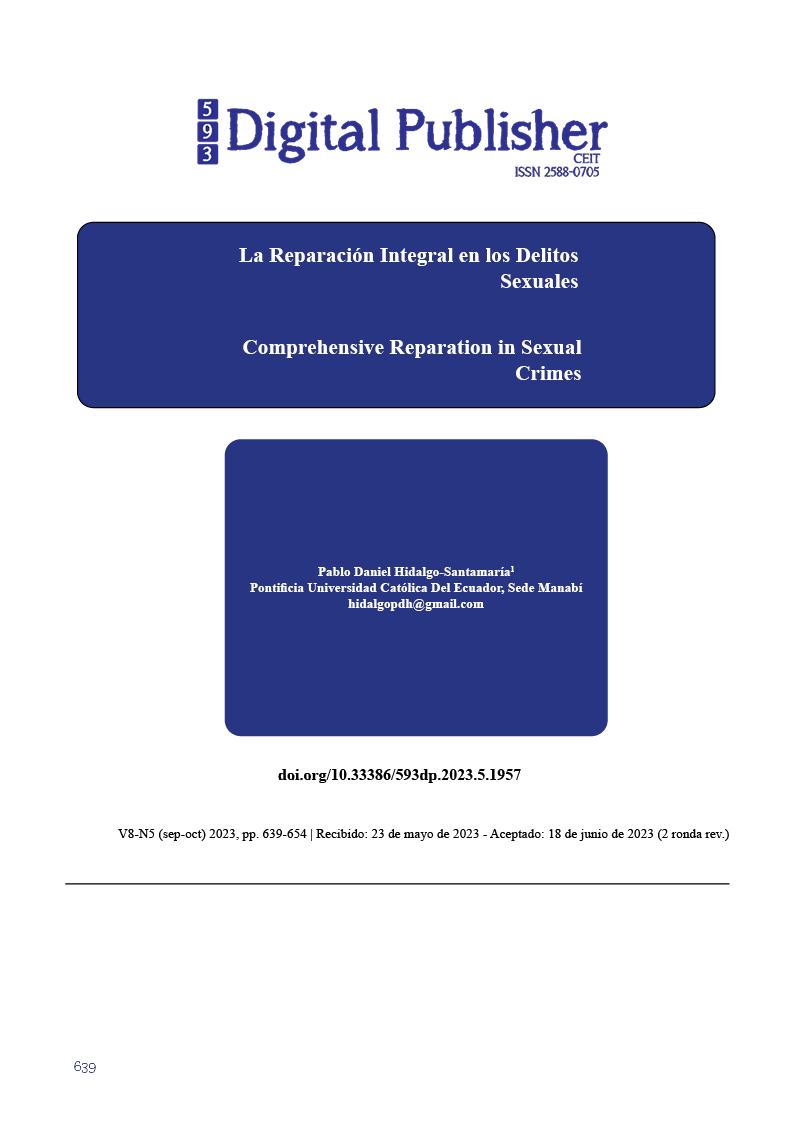Comprehensive Reparation in Sexual Crimes
Main Article Content
Abstract
In Ecuador, the rights of its inhabitants are recognized by the Constitution promulgated in 2008, where rights are granted the characteristics of being inalienable, inalienable, indivisible, interdependent and of equal hierarchy. Under this heading, the supreme norm of the Ecuadorian State provides for comprehensive reparation as a right possessed by every victim who has been declared as such. That is to say that, according to the current legal regulations, the status of victim of any criminal type is only achieved when a conviction has been obtained.
Sexual crimes are considered the most atrocious that the human being can suffer where the murder of his soul occurs, which entails the generation of permanent traumas that prevent the normal development of the victim who suffered it. The Inter-American Court of Human Rights has indicated that sexual crimes in Ecuador are occupying the third place of criminal conduct with a percentage of about 16%.
Faced with this panorama, the right to comprehensive reparation must contain a broader conceptualization that allows its timely application without the need to wait to obtain the respective sentence from the criminal court, that is, the State has the obligation to adapt to the evolution of the law to make effective its role as guarantor against violations of rights in its inhabitants and allow victims to obtain some prior measures of reparation. International legislation has incorporated into its regulations programs that guarantee first-hand at least financial compensation from the State itself.
Downloads
Article Details

This work is licensed under a Creative Commons Attribution-NonCommercial-ShareAlike 4.0 International License.
1. Derechos de autor
Las obras que se publican en 593 Digital Publisher CEIT están sujetas a los siguientes términos:
1.1. 593 Digital Publisher CEIT, conserva los derechos patrimoniales (copyright) de las obras publicadas, favorece y permite la reutilización de las mismas bajo la licencia Licencia Creative Commons 4.0 de Reconocimiento-NoComercial-CompartirIgual 4.0, por lo cual se pueden copiar, usar, difundir, transmitir y exponer públicamente, siempre que:
1.1.a. Se cite la autoría y fuente original de su publicación (revista, editorial, URL).
1.1.b. No se usen para fines comerciales u onerosos.
1.1.c. Se mencione la existencia y especificaciones de esta licencia de uso.
References
Aguirre Castro, P. & Alarcón Peña P. (2018). El estándar de la reparación integral en la jurisprudencia de la Corte Constitucional. Revista de derecho, N.30 Julio-Diciembre. 2018.
Albán Gómez, E (2015). Manual de Derecho Penal Ecuatoriano. Quito, Ecuador: Ediciones Legales.
Asamblea General de las Naciones Unidas. (29 de noviembre de 1985). Declaración sobre los principios fundamentales de justicia para las víctimas de delitos y abuso de poder. Resolución 40/34 de 29 de noviembre de 1985.
Asamblea Nacional del Ecuador. (10 de febrero de 2014). Código Orgánico Integral Penal. Registro Oficial Suplemento 180 de 10 de febrero de 2014.
Asamblea Nacional del Ecuador. (5 de febrero de 2018). Ley Orgánica para prevenir y erradicar la violencia contra las mujeres. Registro Oficial Suplemento 175 de 05 de febrero de 2018.
Capitant, H. (1975). Vocabulario Jurídico. Buenos Aires: Ediciones Depalma.
Congreso General de los Estados Unidos Mexicanos (9 de enero de 2013). Ley General de Víctimas. Diario Oficial de la Federación 9 de enero de 2013.
Constitución de la República del Ecuador. [Const.] (20 de octubre de 2008). Registro oficial N. 449.
Corral Talciani, H. (2004). Lecciones de Responsabilidad Civil Extracontractual. Santiago de Chile: Editorial Jurídica de Chile.
Corte Constitucional Colombiana (2008). Sentencia C-1199 de 2008, en Contenido y Alcance del Derecho de Reparación: Instrumentos para la Protección y Observancia de los Derechos de las Víctimas, información encontrada en la página oficial de la Defensoría del Pueblo de Colombia.
Couture Etcheverry, E. (1978). Vocabulario Jurídico. Buenos Aires: Ediciones Depalma.
Cueva Carrión, L. (2015). Reparación Integral y Daño al Proyecto de Vida. Quito, Ecuador: Ediciones Cueva Carrión.
Ecuador Instituto Nacional de Estadísticas y Censos (2011). Encuesta Nacional sobre Relaciones Familiares y Violencia de Genero contra las Mujeres –ENVIGMU- 2011. Ecuador en Cifras
Ecuador Instituto Nacional de Estadísticas y Censos (2019). Encuesta Nacional sobre Relaciones Familiares y Violencia de Genero contra las Mujeres –ENVIGMU- 2019. Ecuador en Cifras. Recuperado de https://www.ecuadorencifras.gob.ec/documentos/web-inec/Estadisticas_Sociales/Violencia_de_genero_2019/Principales%20resultados%20ENVIGMU%20201 9.pdf
Fiscalía General del Estado. (4 de abril del 2014). Reglamento del sistema de protección a testigos y víctimas. Resolución de la Fiscalía General del Estado 24. Registro Oficial Suplemento 219 de 4 de abril de 2014.
Flores Ramírez, A. (2019). La reparación integral de las víctimas en los delitos sexuales de violación en el Ecuador. Tesis de maestría en derecho penal. Universidad Central del Ecuador. Recuperado de http://www.dspace.uce.edu.ec/handle/25000/19008
http://www.defensoria.org.co/red/anexos/pdf/04/alcanceReparacion.pdf, 58, 59.
Ledesma Romero, M. (2021). La reparación integral en el delito de violación sexual. Tesis de maestría en derecho penal. Universidad Andina Simón Bolívar. Recuperado de https://repositorio.uasb.edu.ec/bitstream/10644/8192/1/T3577-MDPE-Ledesma-La%20reparacion.pdf
Marchiori, H. (2008). Criminología la Victima del Delito. México: Editorial PORRÚA.
Peña Cabrera A. (2013). Curso elemental derecho penal parte especial. Lima, Legales Ediciones, 465.
Primera Corte Constitucional, (13 de junio de 2013). Sentencia N.o 004-13-SAN-CC, caso N.o 0015-10-AN
Primera Corte Constitucional, (29 de septiembre de 2014). Sentencia N.o 135-14-SEP-CC, caso N.o 1758-11-EP
Rodríguez Moreno, F. (2023). Tratado de Derecho Procesal Penal Tomo I. Quito, Ecuador: Cevallos.
Ruiz Guzmán A., Aguirre Castro P., Avila Benavidez D. & Ron Erráez X. (2018). Corte Constitucional del Ecuador. Reparación Integral:Análisis a partir de la jurisprudencia de la Corte Constitucional del Ecuador. Jurisprudencia constitucional. Quito, Ecuador.
Soleto Muñoz, H. (2020). La ineficacia del sistema de justicia español para reparar económicamente a las víctimas: un espacio para la justicia restaurativa. Teoría y Derecho, Revista de Pensamiento Jurídico. Editorial Tirant. ISSN: 1888-3443.
Tribunal de Justicia de la Unión Europea. (11 de octubre de 2016). Sentencia C-601/14.


